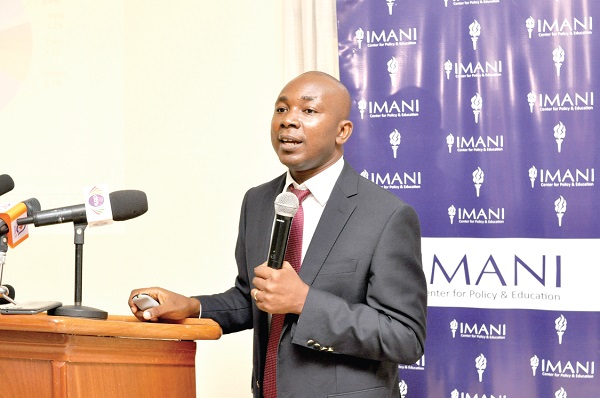
Debt choking Ghana’s economy— Varsity don
A Professor of finance at the University of Ghana Business School, Professor Godfred Bokpin, has described Ghana as a record-holder in debt servicing in sub-Saharan Africa, spending over 45 per cent of its tax revenue to service debt.
He said even though the 2019 budget aimed at generating a total of GH¢45 billion in tax revenue this year, a total of GH¢23 billion would be paid as compensation to employees and GH¢19 billion on interest payment.
The challenge, he said, had resulted in rising debt as the country had to allocate a chunk of the tax revenue it collected just to cover interest payments.
“This is just the interest component on our debt and the principal repayment is not captured as it is done through rollovers, and that is why when the public debt goes up, some are for liability management,” he said.
Unsustainable debt servicing
Delivering a public lecture organised by local think tank Imani Ghana in Accra yesterday, Prof. Bokpin said: “A good example will be the latest Eurobond that we did.
Advertisement
We got $3 billion and we are told that $2 billion will go into infrastructure financing and $1 billion is set aside for liability management, but there is always a base which goes up gradually with every fiscal deficit that we record every year.
While there is certainty with the interest payment and workers’ compensation, there is a lot of uncertainty about tax revenue because this must respond to certain tax measures that are contained in the budget,” he stated.
The Fellow of Imani was speaking on the topic: “Is Ghana’s debt sustainability under serious threat after the IMF programme?”
Sacrificing capital projects
Prof. Bokpin said after paying workers compensation and servicing debt with a total of GH¢42 billion out of the projected GH¢45 billion tax revenue for 2019, the government would be left with GH¢3 billion to meet other statutory obligations.
“We have the GETFund, District Assemblies Common Fund (DACF), among others, and if the government is on course with all its statutory obligations, then the rest of the money will come from borrowing,” he said.
“This is not unique to this current government. It has been with us and it is crowding up our development priorities, as we have to sacrifice capital expenditure,” he added.
With binding financial constraints, he said, the government was doing a lot of financial engineering to manage excessive debt collateralisation and revenue monetisation, adding that “this is because we do not have the fiscal space and the government is trying to fast-forward future revenue to today”.
“That is part of the arrangement the government is doing today with some of our natural resources, because we do not have fiscal space to do infrastructure projects and we have to be a bit careful sacrificing future revenue just to meet today’s needs,” he cautioned.
“Any country that does not make sufficient provisions towards capital spending has either concluded that it does not have a future or it does not intend to take advantage of that.
“So what is happening is that we are running down our infrastructure and we are unable to maintain them,” he added.
Stifling growth drivers
He pointed out that due to a lack of fiscal space, the country was unable to expand its infrastructure base, with the huge infrastructure deficit further imposing restrictions on the growth drivers of the economy.
“The reason the non-oil sector of the economy has not responded the way it should also reflects the lack of appropriate spending on capital expenditure to ease the restriction on growth drivers of the economy,” he explained.
Prof. Bokpin blamed the fiscal challenge facing the country on the failure to collect sufficient tax revenue to meet its expenditure commitments.
He said given Ghana’s theoretical tax frontiers, the country could collect tax revenue in excess of GH¢89 billion, a potential he described as achievable.
“Our tax GDP is 12 per cent, when our peers are doing 24 and 25 per cent and we can actually scale in our revenue mobilisation between five and 12 per cent of GDP, which will range from GH₵18 billion to GH¢45 billion.
“Given a tax effort of GH¢45 billion, we have a gap of GH¢35 billion to cover and Ghana can do between five and 12 per cent of GDP from ¢18 billion to GH¢45 billion,” he added.
